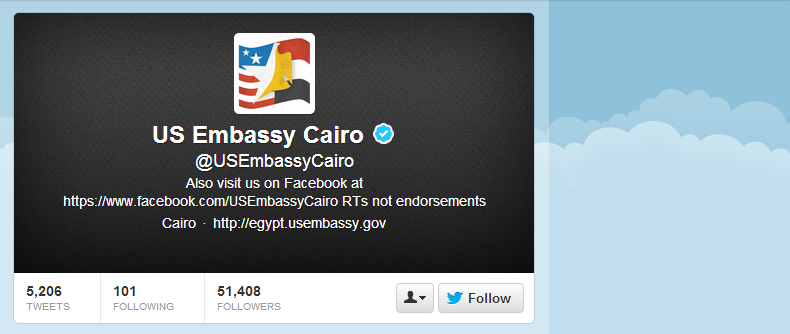Are you struggling to develop a social media policy for your business, organization, brand or nonprofit? You are not alone. If you think the manual has been written or the case study highlighted for you to emulate — think again. But there are lessons to be gleaned along the way.
This past week, the Twitter account of the U.S. Embassy in Cairo (@USEmbassyCairo) was again in the news and is fast becoming a very public case study for social media policies.

How should an official U.S. spokesman (or business leader) respond to situations in a timely, effective and appropriate fashion? As an Embassy sitting smack in the middle of an evolving Twitter revolution, Cairo has become a de facto leader struggling to respond and direct the discussion (or not) in a transparent, universal global forum: social media.
Let’s first back up to September 11, 2012 when their Twitter feed hit the headlines. I was in Cairo on September 11, 2012 when a group of protesters (or rioters), supposedly angered by an anti-Muslim film produced by an American, began to scale the walls of the U.S. Embas. My hotel virtually backed up to the U.S. Embassy in downtown Cairo and by 5 p.m. there were only moderate, chanting crowds. I flew out in the middle of the events, but followed closely on Twitter whenever I was not airborne. Reports from Arab and global media on Twitter seemed to confirm that the crowds quickly dispersed and no injuries were reported. The U.S. Embassy tweeted that night that there would be no visa services at the Embassy the next day. Sadly, the news came that night of the American deaths in Libya and the Twitterverse went into high gear.
The next day, the U.S. Embassy “apologized” for the film insulting Islam, the White House disavowed the apology before the State Department seemed to contradict the White House (are you keeping up here?). See the timeline of tweets here.
Two days later the U.S. Embassy confronted the Muslim Brotherhood Twitter account (@Ikhwanweb) about conflicting tweets they were sending in English and Arabic. What followed reads like a Downton Abbey (Maggie Smith) script of innuendo and snide remarks.
Eight months later, enter Jon Stewart. On The Daily Show, Stewart delivered what to my mind may have been his finest performance. His defense of his colleague, Bassem Youssef, an Egyptian comedian who had been detained by Egyptian authorities, was masterful. The U.S. Embassy in Cairo tweeted the link to this video. The Egyptian Presidency account @EgyPresidency and Muslim Brotherhood account both criticized this tweet as inappropriate for a diplomatic mission. The Embassy closed down their Twitter feed, the State Department said they should not have, and the Twitter account reappears without the offending tweet. And to make it all completely cinematic, a fake U.S. Embassy account appeared with Rick Sanchez’s earlier statements against Jon Stewart and on and on. All of this happened over several hours — which was slow in the Twitter world.
What is John Q. Public to glean from this case study — which is far from complete?
I applaud the U.S. Embassy in Cairo for leading the way in trying to respond in real-time using the most effective medium (Twitter) for their universe. An official government statement released 24 hours after any of these events would have landed with a thud. Will they have glitches on the way? Will it expose some inconsistencies in the U.S. government approach to social media? Yes to both. The jury is still out whether the benefits of these exchanges outweighed the internal U.S. public policy debates and partial retractions.
Twitter, Google Plus, Facebook, Weibo, etc., will never present a perfect, neat platform that can be micromanaged from top down or worse yet, outsourced or handed to an intern. But social media policies are needed for any company, brand or organization, yet the success of any policy in accomplishing your goals rests on two factors.
1. Is senior management invested in social media? Do they have accounts and do they use them, even if sparingly? Do they know how to use them quickly when necessary? I guarantee if Virgin has any type of crisis, Richard Branson will be updating the world on Twitter, personally. Carnival Cruise Lines could have done much more on Twitter and instead relied on scheduled press conferences. (In between these the news media was reporting Twitter feeds from the ship with silence from Carnival.)
2. The purpose of a social media policy is not to silence those responding in real-time. It means hiring the appropriately skilled (not just in social media but in the policies/product you cover) staff and senior staff managing them and empowering them to respond as appropriate in a timely fashion. They must also have the judgment to determine which issues must go up the ladder to someone with higher authority who will respond or give direction immediately when necessary. That is the rapid fire social media world we live in. We must all learn to live in it.
All of us, the U.S. government included, will face glitches and contradictions along the way, some more public than others. This is new territory for everyone. Integrating social media into your business model is no longer a choice. You are on social media, whatever you do and whether you know it or not. Good luck to us all!
